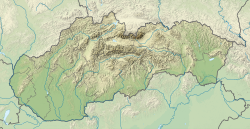New Synagogue (Žilina)
| New Synagogue | |
|---|---|
Slovak: Nová Synagóga | |
 The façade of the former synagogue in 2016, following restoration | |
| Religion | |
| Affiliation | Neolog Judaism (former) |
| Rite | Nusach Ashkenaz |
| Ecclesiastical or organisational status |
|
| Status |
|
| Location | |
| Location | 1 Kuzmányho Street, Žilina |
| Country | Slovakia |
Location of the former synagogue in Slovakia | |
| Geographic coordinates | 49°13′29″N 18°44′14″E / 49.22465°N 18.73721°E |
| Architecture | |
| Architect(s) | Peter Behrens |
| Type | Synagogue architecture |
| Style | Modernist |
| Groundbreaking | 1928 |
| Completed | 1931 |
| Specifications | |
| Capacity | 800 worshipers |
| Dome(s) | One |
| Dome height (inner) | 17.6 metres (58 ft) |
| Dome dia. (inner) | 16 metres (52 ft) |
| Materials | Concrete |
| Website | |
| novasynagoga | |
| [1] | |
The New Synagogue (Slovak: Nová Synagóga), sometimes referred to as the Neological Synagogue (Slovak: Neologická synagóga) or Neolog Synagogue (Slovak: Synagóga Neológov), is a former Neolog Jewish congregation and synagogue, located in Žilina, Slovakia.
Completed in 1931 to the designs of the German Modernist architect Peter Behrens, it was completed eight years before World War II, which almost obliterated the Jewish population of Slovakia,[a] and it has been called "the last Slovak synagogue".[3]: 199 Having been used for other purposes after World War II, it was restored between 2011 and 2017 to become an arts center.
History
[edit]The town of Žilina had been resistant to Jewish settlers and by the middle of the nineteenth century, only two Jewish families lived there.[4] An early synagogue of c. 1860 was replaced by a new one in 1880.[5] The Jewish community in Žilina continued to grow, reaching about 3,000 in the early 1930s.[6]: 17 During the 1920s an international competition was launched for a modern synagogue for the Reform Judaism congregation; competitors included Lipót Baumhorn and Josef Hoffmann. The competition was won by Behrens and the synagogue was constructed between 1928 and 1931.[7]: 160 In 1934 Behrens joined the Nazi Party and later worked on Hitler's plans for redesigning Berlin.[8]
After World War II, from which only 600 Jews returned to the city, the building was taken over by the town for cultural purposes, including an assembly hall for Žilina University and a cinema.[5][7]: 160
Since 2012 the synagogue has been under restoration for use as an art gallery and cultural centre. From 2014, the work has carried out by the NGO Truc sphérique, with the aid of an EEA grant from Norway, Liechtenstein and Iceland and with the support of the town of Žilina and the town's remaining Jewish community. Work included restoration of wall surfaces in the interior and the façade of the building. The synagogue building opened for events in August 2016 and the restoration was completed in July 2017.[9][10][11]
Design
[edit]The synagogue was built to accommodate 450 men in the prayer hall with 350 women in the galleries. The hall features high, narrow windows. The dome over the hall has a diameter of 16 metres (52 ft) and a height of 17.6 metres (58 ft). The low front entrance is accessed by a flight of steps from street level.[12] The front façade was considerably altered in the period 1945-1980. The congregational hall retained its domed structure, but the women's galleries which lined the upper storey were removed.[7]: 160 The 2017 restorations reinstated many of the original interior and design features.
Gallery
[edit]-
Interior of the restored dome of the synagogue
-
The synagogue shortly after completion, from a postcard, c. 1931
See also
[edit]Notes
[edit]References
[edit]- ^ "New Neolog Synagogue in Žilina". Historic synagogues of Europe. Foundation for Jewish Heritage and the Center for Jewish Art at the Hebrew University of Jerusalem. n.d. Retrieved July 21, 2024.
- ^ "Czechoslovakia". The YIVO Encyclopedia of Jews in Eastern Europe. Retrieved July 30, 2015.
- ^ Dulla, Matúš (2004). "Posledná synagóga: vznik a podoba synagógy Neológov v Žiline od Petra Behrensa" [The last synagogue: on the origin and form of the Neolog synagogue in Žilina by Peter Behrens]. Architektúra a urbanizmus (in Slovak). 38 (3–4). Bratislava: 199–215.
- ^ "History of Jews in Žilina". Kehila Zilina. 2007. Retrieved November 23, 2014.
- ^ a b "Neological Synagogue". Žilina Official Tourist Portal. n.d. Retrieved November 23, 2014.
- ^ Ďuriníková, Anna (2012). Neologická synagóga v Žiline [Neological Synagogue in Žilina] (PDF) (Bachelors thesis) (in Czech). Brno: Masaryk University. Retrieved November 23, 2014.
- ^ a b c Borský, Maroš (2007). Synagogue Architecture in Slovakia: Towards Creating a Memorial Landscape of Lost Community (PDF). Hochschule für Jüdische Studien (PhD thesis). Heidelberg. Retrieved November 23, 2014.
- ^ "Peter Behrens". Awards: Royal Gold Medal Exhibition. Royal Institute of British Architects. n.d. Retrieved July 24, 2015.
- ^ Močková, Jana (May 10, 2017). "Nikdy ich neopustila naivná viera, že to nakoniec dajú. Po 6 rokoch otvárajú žilinskú synagógu". Denník N (in Slovak). Retrieved May 6, 2020.
- ^ "Grants". New Synagogue (in Slovak).[self-published source?]
- ^ "Project summary description" (PDF). New Synagogue.[self-published source?]
- ^ "Neologic Synagogue". Register of Modern Architecture on Slovakia. n.d. Retrieved July 24, 2015.
External links
[edit]- Official website (in English)
- Baumhorn, Lipót (1920). "Plans: Žilina Synagóga" (images) (in Slovak).
- 1931 establishments in Slovakia
- 20th-century synagogues in Slovakia
- Ashkenazi Jewish culture in Slovakia
- Ashkenazi synagogues
- Buildings and structures in Žilina Region
- Cultural centers in Slovakia
- Former synagogues in Slovakia
- Modernist architecture in Slovakia
- Modernist synagogues
- Neolog synagogues in Slovakia
- Synagogue buildings with domes
- Synagogues completed in 1931



